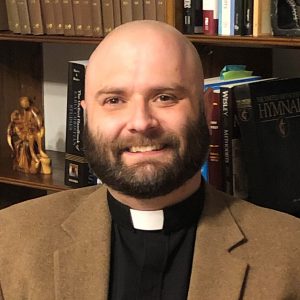Adam Ployd
Supervisor
ap2287@wesley.cam.ac.uk

The Revd Dr Adam Ployd was Wesley House’s Vice Principal from 2021 to 2023 and is currently Dean of Davenport College at Yale University. As a member of the Wesley House academic team, Adam supervises a number of PhD students.
Research and teaching interests
My interests range across both historical and practical theology. I am, by profession, a scholar of Augustine (354-430 CE), whose thought has, for better or worse, shaped the theology of western Christianity inescapably. From Augustine, I move to the general history of doctrine and practice – including Wesleyan theology – within the broader swath of Christian history. Ultimately, I do not wish this scholarship to be purely theoretical; rather, I believe such resources are crucial to the ongoing life of discipleship and ministry. Thus, I am also interested in practical theology that is robustly theological even as it attends to the practices of ministry.
Research students
I’ve supervised students from a range of global contexts including from Kenya, India, South Korea and the United States. The topics have combined my historical interests with present concerns such as, “The Pedagogy of Clement: A Model for Teaching Youth in the Reformed Church of East Africa” and “Francis of Assisi’s Understanding of Animals as Inspiration to the Korean Churches.”
Qualifications
- PhD Emory University, Religion (Historical Theology), 2013
- MDiv Candler School of Theology, Emory University, 2006
- BA Wake Forest University, Religion, 2003
Recent publications
- Augustine, the Trinity, and the Church: A Reading of the Anti-Donatist Sermons, Oxford University Press, (2015)
- “Augustine’s Martyrs as Ideal Christian Rhetors,” Augustiniana (2021).
- “Sir 34:30 and Forensic Rhetoric in Augustine’s Conflict with the Donatists,” Vigiliae Christianae 75 (2021).
- “Augustine, Martyrdom, and the Exemplary Rhetoric of History,” Journal of Early Christian Studies 28, no. 3 (2020): 423-441.
- “What Makes a Martyr? The Movement for Black Lives and the Power of Rhetoric Old and New,” Journal of Ecumenical Studies 55 (2020): 33-45.
- “Inseparable Virtue and the Imago Dei in Augustine: A Speculative Interpretation of De Trinitate 6.4,” Scottish Journal of Theology 72, no. 2 (2019): 146-165.
- “‘As the Catholic Faith Believes’ (c. Sec. 5): Unigenitus as Pro-Nicene and Anti-Manichean in Augustine,” Journal of Theological Studies 70, no. 1 (2019): 251-270.
- “Non poena sed causa: Augustine’s Anti-Donatist Rhetoric of Martyrdom,” Augustinian Studies 49, no. 1 (2018): 25-44.
- “Attending to the Word: A Concluding Look at Latin Patristic Preaching and A Vision for the Way Forward,” in Preaching in the Patristic Era: Sermons, Preachers, and Audiences in the Latin West, edited by Anthony Dupont, et alia. Brill, 2018. 479-497.
- “Participation and Polemics: Angels from Origen to Augustine,” Harvard Theological Review 110, no. 3 (2017): 421-439.
- “The Power of Baptism: Augustine’s Pro-Nicene Response to the Donatists,” Journal of Early Christian Studies 22, no. 4 (2014): 519-540.
- “Pro-Nicene Prosopology and the Church in Augustine’s Preaching on John 3:13,” Scottish Journal of Theology 67, no. 3 (2014): 253-264.
- “Thinking Historically,” in Thinking Theologically, edited by Eric Barreto. Fortress, 2015. 63-78.
- “Tres Unum Sunt: The Johannine Comma in Cyprian,” Studia Patristica 65 (2013): 451-458.
- “The Unity of the Dove: The Sixth Homily on the Gospel of John and Augustine’s Trinitarian Solution to the Donatist Schism,” Augustinian Studies 42, no. 1 (2011): 57-77.



